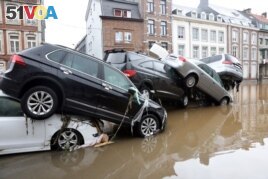Massive flooding killed at least 195 people in northern Europe last week. Massive wildfires are burning across much of the western United States. These extreme weather events, scientists warn, are clear signs of global warming. And they say more is needed to be done to fight climate change.
Floods in Europe
In Europe, officials continue to find more bodies as floodwaters drop across affected areas of Germany, Belgium, and the Netherlands. So far, 164 are confirmed dead and hundreds are missing in the affected areas of Germany. At least 31 people died in Belgium.
The rains that led to last week’s floods were expected. However, politicians and weather forecasters were shocked by the amount of rain and the powerful, sudden floods that it caused. Warnings of danger came too late for many people living along Germany’s rivers. Local officials described the weather event as “an explosion of the water” that destroyed buildings, electricity, and cell phone networks.
At one point, water went over the top of the Steinbach Reservoir dam in North Rhine-Westphalia state causing fear that the dam might break. It did not. The state governor said the dam was designed for a risk that might happen once every 10,000 years.
“This was exceeded in the last few days,” he said.
Wim Thiery, a professor at Brussels University, spoke to the Associated Press Friday. He said of the flooding, “There is a clear link between extreme precipitation occurring and climate change.”
 Words in This Story
Words in This Story
global – adj. involving the entire world
exceed – v. to go beyond the limit of something
precipitation – n. water that falls to the ground
occur – v. to happen
virtually – adv. very nearly
trend – n. a general direction of change
resilient – adj. able to return to original shape